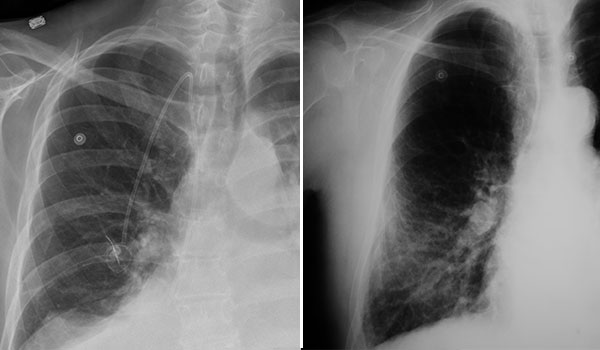Initially misdiagnosed with a fibroid tumor, a laparoscopy revealed Tamron’s peritoneal mesothelioma. Her doctor’s unfamiliarity with mesothelioma led Tamron to seek a second opinion from specialist Dr. Levine. He offered clear options and hope. Tamron tells us a second opinion with an expert was a crucial step in her journey to becoming an 18-year mesothelioma survivor.
Mesothelioma Misdiagnosis
Mesothelioma misdiagnosis occurs when a doctor mistakes mesothelioma for a different, less serious condition. Misdiagnosis of mesothelioma is common because the symptoms of the cancer often resemble other conditions such as a cold or the flu. A second opinion is recommended.
Why Is Mesothelioma Misdiagnosed?
Malignant mesothelioma is often misdiagnosed. Its symptoms are not specific to this rare cancer. Fewer than 3,000 new mesothelioma cases are reported each year. Most doctors have limited experience with it. They tend to suspect more common conditions first.
Symptoms may vary, based on tumor location. They include shortness of breath, chest pain, and abdominal pain. These nonspecific symptoms make it difficult for doctors to accurately diagnose mesothelioma early. If doctors don’t know a patient was exposed to asbestos, they may misdiagnose it.
Mesothelioma misdiagnosis happens because the accurate diagnosis is challenging. Mesothelioma has unique aspects. They require a pathologist or cytopathologist with mesothelioma experience to evaluate them.
A team of doctors must diagnose malignant mesothelioma. They must know this aggressive cancer. Most physicians and oncologists have rarely or never encountered mesothelioma. They may not understand its complexities or how to treat it. Mesothelioma can resemble other common conditions. To make an accurate diagnosis, the doctor needs to perform a surgical biopsy.
Mesothelioma misdiagnosis happens because the diagnosis of mesothelioma is actually quite challenging. There are some unique aspects to mesothelioma at a microscopic level that require expertise on the part of the pathologist or cytopathologist to evaluate. It really does require experience on the part of the clinician and the team.
Common Misdiagnoses of Pleural Mesothelioma
Pleural mesothelioma, which develops in the lining of the lungs, is often mistaken for other more common respiratory conditions. Patients may initially show shortness of breath, a dry cough or chest pain. These symptoms also resemble emphysema and pneumonia, making it difficult to distinguish it from other respiratory conditions when symptoms first appear.
Pleural mesothelioma can also cause pleural effusion — a buildup of fluid around the lungs — and difficulty breathing. Other chronic lung diseases, infections and lung cancer can all show similar symptoms. These may complicate the diagnostic process and lead to a misdiagnosis of mesothelioma.
- Adenocarcinoma (glandular tissue cancer)
- Chronic obstructive pulmonary disease (COPD)
- Emphysema
- Influenza (flu)
- Lung cancer
- Pneumonia
- Recurrent pleural effusion
The Journal of Thoracic Oncology published a 2023 study about mesothelioma misdiagnoses. It showed that 14% of mesothelioma diagnoses in rich countries are wrong. In developing countries, this misdiagnosis rate rises to approximately 50%. Initial misdiagnosis can happen. Symptoms mimic those of other common conditions. This leads pathologists and doctors with limited experience to suspect other illnesses.
About 33% of women with pleural mesothelioma were misdiagnosed with ovarian cancer. Pleural mesothelioma can raise cancer antigen 125. The antigen is a blood protein linked to ovarian cancer. The vague symptoms make it easy for doctors to suspect other common conditions at first. A correct diagnosis requires a biopsy and a mesothelioma expert.

Receive expert care from doctors who truly understand mesothelioma.
Find a Specialist NowCommon Misdiagnoses of Peritoneal Mesothelioma
Peritoneal mesothelioma forms in the lining around the abdominal organs. Its symptoms are often mistaken for other abdominal conditions. Abdominal pain and digestive issues resemble irritable bowel syndrome, gallstones and other cancers. This complicates the early and accurate diagnosis of peritoneal mesothelioma.
- Gallstones
- Hernia
- Irritable bowel syndrome
- Other abdominal cancers
- Ovarian cancer
BMC Gastroenterology published a study in 2021 about peritoneal mesothelioma misdiagnosis. The study involved a man with previous asbestos exposure. He had a rare case of benign multicystic peritoneal mesothelioma. The doctors first misdiagnosed it as hydatid cysts in the liver and abdomen. He first had abdominal pain and bloating. Imaging showed many cysts filled with clear fluid. The patient did not respond to the treatment. Doctors did further tests.
Peritoneal mesothelioma’s symptoms are hard to tell apart from other abdominal issues. Find a specialist if you’ve been exposed to asbestos and have mesothelioma symptoms. If they confirm peritoneal mesothelioma diagnosis, they will create a treatment plan.
Common Misdiagnoses of Pericardial Mesothelioma
Pericardial mesothelioma is a rarer type of mesothelioma. It affects the pericardium, which is the sac surrounding the heart. This form of mesothelioma often causes pericardial effusion. That’s a buildup of fluid around the heart. It may cause chest pain and other heart symptoms. This makes it hard to diagnose early.
- Angiosarcoma
- Cardiac tamponade
- Cardiomyopathy
- Congestive heart failure
- Constrictive pericarditis
- Coronary artery disease
- Heart disease
- Intra-atrial myxoma
- Metastatic lung cancer
- Tuberculous pericarditis
A 2023 case report described a female patient. She had pericardial calcification. It is a condition where calcium deposits form in the heart’s outer sac. This first resulted in a diagnosis of constrictive pericarditis. Doctors found primary pericardial mesothelioma (PPM) after a CT scan and a biopsy.
Diagnosis of mesothelioma requires a biopsy to collect tissue samples for laboratory analysis. Blood tests, X-rays, and CT scans can rule out other conditions. But they cannot diagnose pericardial mesothelioma. A history of asbestos exposure can help doctors choose tests. This will ensure an accurate diagnosis.
How Can a Mesothelioma Misdiagnosis Affect You?
Misdiagnosing mesothelioma can lead to incorrect or delayed treatment, which can be fatal. Mesothelioma is an aggressive cancer. Delayed treatment can allow it to spread. The more advanced the cancer becomes, the more difficult it is to treat.
Misdiagnosis also increases the financial burden on mesothelioma patients and their families. Its symptoms mirror those of other common conditions. Patients may take extensive tests before getting an accurate diagnosis. These medical exams can be costly. They often do not help the patient’s symptoms.
Early detection and accurate diagnosis are essential to improving treatment outcomes. Dr. Jeffrey Velotta, thoracic surgeon and pleural mesothelioma specialist at Kaiser Permanente Oakland Medical Center in California, said, “If you can catch mesothelioma earlier on, the idea is you can intervene and do more treatment, whether it’s surgery, chemotherapy or immunotherapy. So the earlier we catch it, the more chance you have for living longer.”
A late diagnosis can worsen the prognosis. It can also limit the available mesothelioma treatment options. Patients and their families should know the symptoms of mesothelioma. They should see a specialist if they have a history of asbestos exposure.
How Do Specialists Diagnose Mesothelioma?
Mesothelioma specialists diagnose the disease through a biopsy of the suspected tissue. A pathologist will examine the tissue sample to check for cancer cells. If cancer cells are present, the pathologist will check if it’s mesothelioma. They will also identify the cancer’s stage based on its spread.
Doctors may also run imaging tests. These include X-rays, CT scans and MRIs. They do this to find any abnormalities and rule out other conditions. These images can help. But a biopsy is the only way to diagnose mesothelioma

Early and accurate diagnosis of mesothelioma is crucial. Treating the disease at its advanced stages can complicate matters. Specialists have made advances in identifying biomarkers. Familial BAP1 germline mutations are one example. They show promise for early diagnosis. Researchers are also exploring innovative noninvasive techniques. One samples volatile organic compounds in the breath. This is for early detection of pleural mesothelioma markers. This research is still in its early stages. But finding ways to reduce the misdiagnosis of mesothelioma should improve patient prognosis.
Mesothelioma is an aggressive form of cancer. Delayed treatment can let the cancer spread and limit mesothelioma treatment options. If you’re worried about mesothelioma, experts can help. They have decades of experience with mesothelioma patients. They can give you a second opinion.
Getting a Second Opinion After a Mesothelioma Diagnosis
People who suspect they have mesothelioma should seek a mesothelioma second opinion from an expert. They need a pathologist with experience in mesothelioma to confirm the diagnosis. A mesothelioma specialist will create a personalized treatment plan.
Patients diagnosed early usually qualify for more aggressive treatments. These have a better chance of extending life expectancy for mesothelioma. A second opinion may help. It can prevent a wrong diagnosis or treatment. It can confirm your original diagnosis. Or it can give you peace of mind.
Mesothelioma survivor Kasie Coleman shared with The Mesothelioma Center at Asbestos.com that her determination to keep pushing for answers ultimately saved her life. For more than a year, she endured multiple symptoms and received several misdiagnoses before finally being diagnosed with peritoneal mesothelioma in 2010. “I really had to advocate for it and keep being persistent, I had to keep going back. Even after I received my 2 HIPEC treatments, they said there’s nothing else they can do. I tell people all the time, your prognosis is only as good as the last oncologist that diagnosed you,” Kasie shared.
Patient Advocates at The Mesothelioma Center can help you. They will find the right mesothelioma specialist for your needs. A Patient Advocate will discuss your needs. They will find the right specialist and other resources for you and your family. With their help, you can find a doctor for a second opinion on your symptoms.
- A 2023 study showed 14% of mesothelioma diagnoses in developed countries are incorrect. While more than half of all mesothelioma patients in developing nations were misdiagnosed.
- Limited experience in diagnosing mesothelioma and a tendency to make a definitive diagnosis without sufficient evidence leads to many misdiagnoses.
“Patients with a history of asbestos exposure and symptoms consistent with mesothelioma should consult a specialist to avoid both delay in diagnosis and misdiagnosis that could prolong access to life-saving treatment and affect their overall survival.”
Common Questions About Mesothelioma Misdiagnosis
- Why is mesothelioma so difficult to diagnose?
-
Mesothelioma is hard to diagnose. Its symptoms are vague and like those of other, more common diseases. This disease often causes chest pain, shortness of breath or stomach pain. Doctors may misdiagnose these as a less severe illness. This cancer is very rare. Most doctors misdiagnose it when patients first show symptoms. Further complicating matters, mesothelioma can develop decades after initial exposure to asbestos. Diagnosis requires a biopsy, which makes early and accurate detection difficult.
- What diseases or conditions mimic mesothelioma?
-
Diseases that mimic mesothelioma include pneumonia, emphysema and the flu. Other conditions also include gallstones, hernias, irritable bowel syndrome, and ovarian cancer. Doctors say abdominal pain, digestive issues, and heart disease may resemble mesothelioma. So may lupus, tuberculosis and other cancers.
- How can a mesothelioma diagnosis be confirmed?
-
A biopsy of the suspected tissue is the only way to confirm a mesothelioma diagnosis. A pathologist must then examine it. Doctors may also use imaging tests, like X-rays, CT scans, and MRIs, to find any abnormalities. Blood tests for biomarkers can help diagnose mesothelioma.








